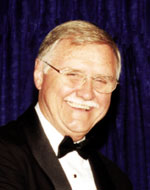Brandt takes office; strikes note of continuity
|
Dr. James H. Brandt assumed the office of 2001-2002 AVMA president at the close of the Association's Annual Convention in Boston, July 18. He succeeds Dr. James E. Nave of Las Vegas.
In his July 12 address to the AVMA House of Delegates, Dr. Brandt delivered a message commensurate with the theme of the Boston convention: "Preserving our heritage and revolutionizing our future." The retired small animal practitioner from Florida drew from the wisdom of past AVMA presidents as a guide for the Association's success in an uncertain future. And with a nod to the city where he was to take office, Dr. Brandt referenced the qualities and goals that made Bill Russell a legend playing for the Celtics. "[Russell] was a rare blend of the consummate leader, mentor, and dedicated team player," he said. "And he approached the game with an attitude—an attitude based on strength, determination, and an uncompromising vision of not only how to do the thing right, but how to do the right thing." These same qualities and goals can help the AVMA achieve its mission, Dr. Brandt said. He pledged himself to maintaining the economic and mentoring programs started during the terms of previous AVMA presidents. In addition, Dr. Brandt proposed the creation of a full-time position for a lawyer at the AVMA to provide legal assistance in a cost-effective manner. He called on the Executive Board to impanel a task force to evaluate plans for the redesign of the first floor of AVMA headquarters in Schaumburg Ill., and the beautification of the grounds. "Our location needs to make a statement of who we are," he said. Dr. Brandt issued a challenge to join him in contributing to the American Veterinary Medical Foundation as a show of solidarity. Contributing to the AVMF, he said, demonstrates commitment to constituencies, and could make the difference with various members of Congress in the AVMA initiative to have an office of veterinary medicine opened in the National Institutes of Health. Former president Dr. Mary Beth Leininger, Dr. Brandt noted, took up the call to professional unity in her address to the HOD in 1996. T-E-A-M, he remembers her saying, means Together Everyone Achieves More. "To achieve more together," he said, "organized veterinary medicine must develop a tough attitude, an attitude with a strong statement." As such, Dr. Brandt admonished the delegates to support the AVMA's efforts to defeat the initiative by the American Association of Veterinary State Boards to convince state licensing boards to adopt that group's new model practice act. The AVMA has "grave reservations" about the proposed act, he said, and its hasty approval could be detrimental to veterinary medicine. One way the AVMA is working to improve the profession is through its partnership with the National Commission on Veterinary Economic Issues. Dr. Brandt noted it was former AVMA president Dr. Sherbyn W. Ostrich who, in his HOD address in 1995, saw the profession facing an economic crisis. That challenge to improve the profession's economic base, Dr. Brandt said, led to the creation of the NCVEI. Dr. Brandt believes the NCVEI will usher in a new age of veterinary medicine, one where successful practices will be those using the latest technologies. Just as Russell asked his teammates, "How can I help?" veterinarians can help the profession by working with the NCVEI. Recalling a speech to the HOD by former president Dr. John I. Freeman in 1997 in which he cautioned against letting diversity lead to the profession's undoing, Dr. Brandt said the AVMA acts as a "cover" for the profession, containing all the sectors to the benefit of the whole. "AVMA is veterinary medicine or veterinary medicine is AVMA. Either way it's stated, it's correct," he said. Intellectual capital is the profession's most valuable asset, and veterinarians must impart that to others. Picking up the popular theme of branding, or fostering product loyalty, Dr. Brandt said mentoring is the ideal vehicle to encourage commitment within the veterinary profession. He said he supported the addition of one or more participants in the AVMA/AVMF Congressional Science Fellowship program, seeing it as an opportunity to increase exposure in Washington, D.C. The fellows, he said, show legislators and the public that veterinarians should be advisers on policies pertaining to public and animal health. (The HOD did ultimately approve a resolution authorizing funding for two fellows.) Dr. Brandt ended his speech with a brief look at globalization and its effects on veterinary medicine in the United States. The AVMA has an obligation to assist every nation in its pursuit of educational equivalency, he said, collaborating with these countries without compromising the value of veterinary education in AVMA-accredited or -approved veterinary colleges. Competency in veterinary medicine is not exclusive to the United States, however, and the AVMA should proceed in this area with a measure of circumspection. "We need to assist without the homogenization of the veterinary profession," Dr. Brandt said, "and we need to assist without the Americanization of veterinary medicine in other countries." | ||
